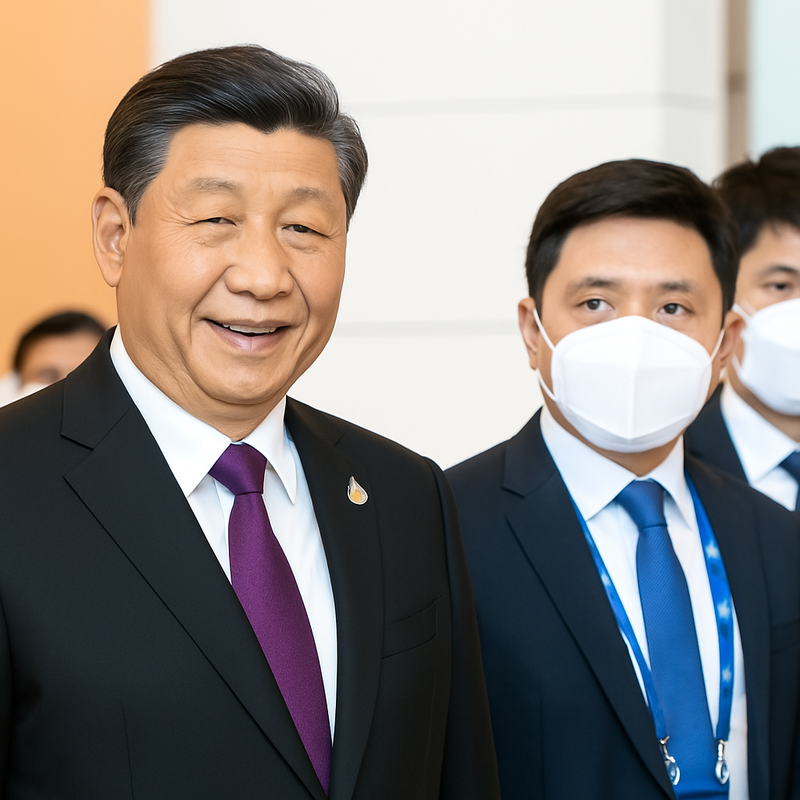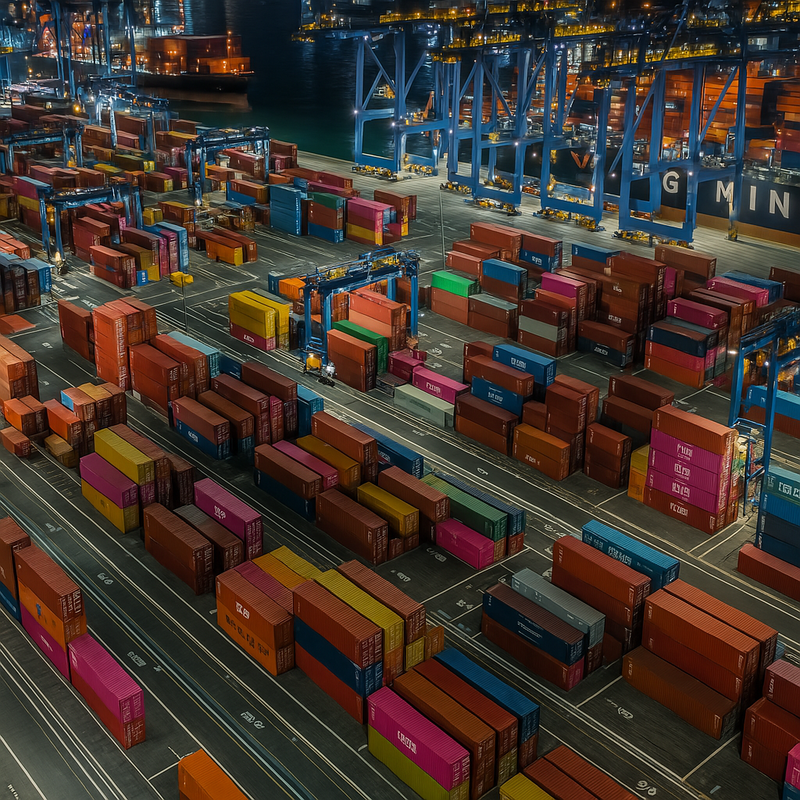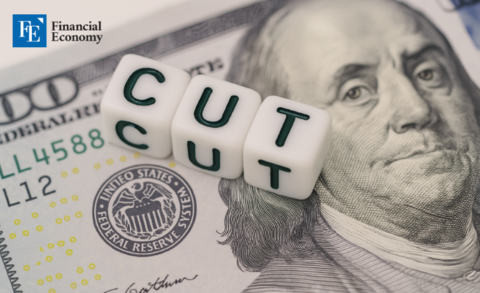Xi’s Charm Offensive: China’s Strategic Counter to Trump’s New Tariffs
Input
Modified
A Diplomatic Power Play: Xi’s Direct Appeal to Business Leaders Betting on AI: China’s High-Tech Lifeline in a Trade War When Tariffs Backfire: Business Fears and Historical Lessons

A Diplomatic Power Play: Xi’s Direct Appeal to Business Leaders
In the world of global business and international diplomacy, trade wars and tariffs often lead to uncertainty and challenges for multinational companies. As former President Trump prepares to unveil new tariffs on Chinese imports, many business leaders are watching closely, considering how to navigate the shifting trade landscape. Surprisingly, just days before the announcement of these tariffs, Chinese President Xi Jinping launched a charm offensive aimed at global business executives, signaling China’s intent to maintain its influence in global markets despite mounting economic pressure. The gesture has left many pondering: What can China offer to global businesses, especially as it faces a trade war with the U.S.? More importantly, what message is Xi sending to Trump and the world?
For companies operating in the crosshairs of the U.S.-China trade dispute, the idea of attending Xi Jinping’s event may seem counterintuitive. After all, Trump’s tariffs have already created a volatile environment for businesses, adding costs, uncertainty, and logistical headaches. Many are looking for any signs that might help them steer through the storm. Xi’s decision to personally engage with global CEOs at this pivotal moment suggests that China is not simply going to accept its economic challenges passively—it is taking action to attract and retain foreign investment and business partnerships.
This move by Xi may be more than just a charm offensive aimed at smoothing over relations with business leaders. It is also a subtle warning to Trump that China is more resilient than it might initially appear. The days leading up to the unveiling of new tariffs have become a stage for this high-stakes geopolitical chess game, and Xi’s personal appearance may indicate that China is prepared for the challenges ahead, ready to offer more to global businesses than many initially thought.
One of the most striking elements of Xi Jinping’s recent charm offensive is that it was not his junior staff or foreign ministers who represented China at the event, but Xi himself. This marks a significant shift in China’s approach to international diplomacy, particularly in the context of the ongoing trade war with the U.S. For Xi to personally meet with global business leaders in Beijing just days before Trump announces fresh tariffs sends a clear signal: China is serious about protecting its trade relationships and is actively seeking ways to bolster its economic position.
In a global business environment where uncertainty and risk are high, this move is both a display of confidence and a strategic invitation to companies to continue or expand their operations in China. Xi’s involvement also highlights that China is not waiting idly for the U.S. to act. Instead, it is working proactively to preserve its status as a central player in global trade. The optics of Xi personally engaging with top executives from around the world serve to reinforce China’s commitment to being an attractive business hub and a powerful force in the global market, even in the face of tariffs and economic pressure from the U.S.
While it’s rare for a leader of Xi Jinping’s stature to personally attend such meetings, this move is likely calculated to send a strong message to business leaders: China remains open for business, and it is committed to ensuring that global trade remains as fluid and beneficial as possible, despite the challenges posed by tariffs.

Betting on AI: China’s High-Tech Lifeline in a Trade War
Just a few months ago, the prevailing consensus among economists was that China was facing significant challenges in recovering from an economic downturn and deflation. The global trade war, coupled with the effects of the COVID-19 pandemic, had placed considerable strain on China’s economy. With slowing growth and mounting debt, many wondered if China would be able to regain its footing in a way that could attract global business.
However, a shift is happening. The rise of China’s artificial intelligence (AI) sector, supported by a deep investment in research and development, has sparked new hope for the country’s economic future. AI has the potential to not only rejuvenate China’s economy but also provide new opportunities for global businesses. This rapidly developing sector is becoming a critical tool for mitigating some of the economic challenges caused by the trade war, particularly the pain caused by tariffs.
For global business leaders, this presents a fascinating opportunity. China is positioning itself as a leader in AI, with applications ranging from smart manufacturing to autonomous vehicles and data analytics. As companies look for new ways to innovate and stay ahead in an increasingly competitive global market, China’s AI sector could offer them valuable partnerships, access to cutting-edge technology, and new avenues for growth. This shift in China’s economic focus may not have been anticipated by many, but it could very well provide a way for the country to weather the economic storm brought on by the trade dispute with the U.S.
Xi Jinping’s personal push to showcase China’s AI capabilities is a reminder that the nation’s economic strategies are evolving in response to the challenges posed by tariffs and other external pressures. While tariffs may have initially hindered China’s growth, the rise of AI could offer new avenues for business opportunities that transcend the limitations imposed by trade barriers.

When Tariffs Backfire: Business Fears and Historical Lessons
For many business leaders, the ongoing tariff dispute between the U.S. and China is not just a matter of short-term economic pain—it’s a long-term issue that could harm businesses on both sides. Despite the White House’s push for tariffs as a tool to address trade imbalances and intellectual property theft, history has shown that tariffs rarely achieve their intended goals without significant backlash.
In past trade disputes, tariffs have often led to unintended consequences, such as retaliation, market disruptions, and higher costs for consumers. While the U.S. may gain temporary leverage through tariffs, the broader economic impacts can create instability, particularly for companies that depend on global supply chains. Business leaders understand this dynamic all too well, which is why many are looking beyond the short-term effects of Trump’s tariff proposals and focusing on the long-term trends.
From this perspective, many within the business community see Trump’s tariff strategy as a temporary measure that will face increasing resistance over time. History has shown that tariffs often lead to greater economic disruption than their proponents anticipate, which is why they are rarely sustained for long periods. The backlash from businesses, consumers, and even political factions within the U.S. could eventually force a reevaluation of the tariff strategy. In this context, China’s charm offensive and Xi Jinping’s personal outreach to global business leaders could be seen as a preemptive move to capitalize on the shifting dynamics of the trade war.
China knows that it can offer businesses more than the U.S. in some sectors, particularly in technology, manufacturing, and infrastructure development. As tariffs become less effective over time, China may use this opportunity to call back global businesses, offering them the stability, growth potential, and strategic advantages they need to thrive.
Xi Jinping’s charm offensive and his personal engagement with global business leaders represent a significant moment in the ongoing U.S.-China trade war. As Trump prepares to unveil new tariffs, China is positioning itself as a resilient and attractive player in the global economy. While tariffs may give the U.S. some short-term leverage, the broader implications for businesses on both sides of the Pacific remain uncertain. Business leaders are aware that the economic backlash against tariffs will eventually force a reevaluation of trade policies.
For China, the rise of artificial intelligence and other emerging sectors could mitigate some of the pain caused by tariffs and provide fresh opportunities for collaboration with global businesses. Meanwhile, the personal involvement of Xi Jinping signals to the world that China is ready to continue playing a key role in global trade, regardless of the challenges it faces.
In the end, this moment serves as both an opportunity and a warning. As Trump moves forward with his tariff proposals, China is reminding the world that it has the resilience, strategy, and leadership to weather the storm. Whether or not these new tariffs will succeed in reshaping the trade relationship between the two countries remains to be seen, but Xi’s charm offensive underscores the complexity of the global trade war and the lengths to which China is willing to go to protect its interests.





















